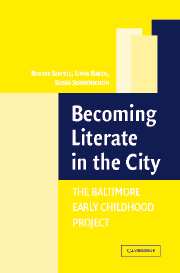Book contents
- Frontmatter
- Contents
- Preface
- 1 Early Appropriation of Literacy in Sociocultural Context
- 2 Growing Up in Baltimore : The Early Childhood Project
- 3 The Intimate Culture of Children's Homes
- 4 Processes of Literacy Enculturation in the Home
- 5 The Development of Literacy Competencies and Orientations
- 6 The Agenda and Practices of Schooling
- 7 Relations Between Homes and Schools
- 8 Conclusions and Implications for Policy and Practice
- References
- Name Index
- Subject Index
7 - Relations Between Homes and Schools
Published online by Cambridge University Press: 17 December 2010
- Frontmatter
- Contents
- Preface
- 1 Early Appropriation of Literacy in Sociocultural Context
- 2 Growing Up in Baltimore : The Early Childhood Project
- 3 The Intimate Culture of Children's Homes
- 4 Processes of Literacy Enculturation in the Home
- 5 The Development of Literacy Competencies and Orientations
- 6 The Agenda and Practices of Schooling
- 7 Relations Between Homes and Schools
- 8 Conclusions and Implications for Policy and Practice
- References
- Name Index
- Subject Index
Summary
Although most of the process of a child's formal education takes place within school, the child's family can and often does influence that process. Families and schools share a common goal of educating children. Sharing that goal does not necessarily mean, however, that families and schools hold the same beliefs about how to accomplish it. In Chapter 3, we presented information about the literacy-related ideas, beliefs, and practices of the parents of children in the Early Childhood Project. In Chapter 6, we discussed the beliefs about learning and schooling held by the children's teachers. In this chapter, we continue our discussion of parents' beliefs about children's learning and development by focusing in more detail on those beliefs most pertinent to children's academic development. We compare parents' and teachers' beliefs about the schooling process and consider how similarities and differences in beliefs may affect children's literacy development. We frame our discussion around two general questions: (1) Is there congruence between the intimate culture of children's homes and the agenda of schooling? In particular, do parents and teachers hold similar beliefs about children's academic development and one another's role in supporting it? and (2) Do parents and teachers hold similar views of the focal children as individuals? The information from parents comes from the seven parental ethnotheory interviews conducted during the 5 years of the Early Childhood Project, as well as from the ecological inventories that documented children's participation in various activities.
- Type
- Chapter
- Information
- Becoming Literate in the CityThe Baltimore Early Childhood Project, pp. 218 - 250Publisher: Cambridge University PressPrint publication year: 1958



